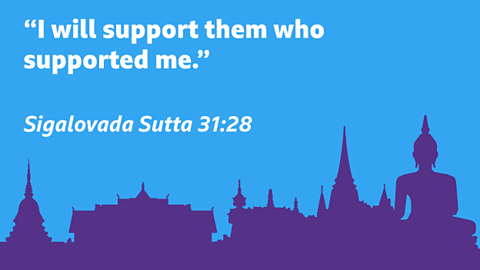Key points about relationships and family
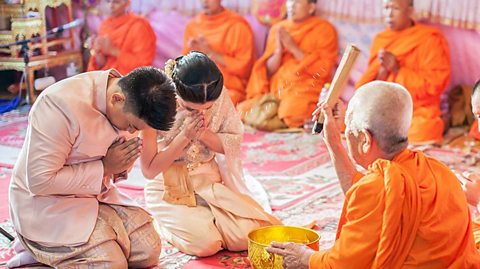
- Four Noble TruthsFour вҖҳtruthsвҖҷ that the Buddha discovered during his Enlightenment, about what causes suffering and how we can be free of it. explain that suffering is caused by craving and can be lessened by living according to the BuddhaвҖҷs Noble Eightfold Path.
- Buddhism has a long tradition of monastic celibacySome Buddhists choose to live as monks or nuns. This includes being celibate: ie choosing not to have sexual relationships.. However, most Buddhists live in couples or families, married or unmarried.
- Buddhism does not involve the worship of a creator or God who blesses or requires marriage. Therefore, Buddhist marriage is often seen as a legal agreement between partners, instead of a religious duty. However, many Buddhists may see their marriage as a significant social and spiritual life event.
- Buddhist tradition recognises sex as a part of human life. The Buddha taught of the need to avoid causing harm, whether in same, or opposite sex relationships.


Remember
The Four Noble Truths are one of the most important teachings of the BuddhaAround 2,500 years ago, a man called Siddhartha Gautama was born. At his Enlightenment he became known as the Buddha, which means вҖҳthe one who knowsвҖҷ. The path of training he taught is known as Buddhism.. They consist of the following teachings:
Life can never be perfect. It always involves some suffering (dukkha).
The cause of suffering is desire (samudaya).
It is possible to end suffering (nirodha).
The way to end suffering is by following the Noble Eightfold Path.
These teachings can be applied in all areas of life, including family and relationships.
The nature and purpose of the Buddhist family
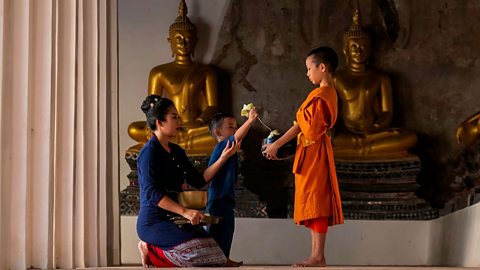
Buddhism has a long tradition of encouraging monastic celibacySome Buddhists choose to live as monks or nuns. This includes being celibate: ie choosing not to have sexual relationships.. This is because the life of a nun or monk, free of sex and family responsibilities, may provide the best conditions for practising the BuddhaвҖҷs teachings. However, most Buddhists live in couples or families, married or unmarried.
Buddhist families vary according to the customs of the country they live in, and include nuclear familyA family unit consisting of two adults and any number of children living together. The children might be biological, step or adopted. , extended families and same-sex parents, as well as couples without children.
The Five Moral Precepts and the Noble Eightfold Path are important guides for the Buddhist family and other areas of life.

The early Buddhist scriptures teach that husbands and wives should respect and honour, show love and trust, and remain faithful to each other.
They also teach that parents should practise the The Four Sublime StatesThe Buddha believed that the mind of a Buddhist should focus on the beautiful and excellent qualities of loving-kindness (metta), compassion (karuna), sympathetic joy (mudita) and equanimity (upekkha). of loving-kindness, compassion, sympathetic joyTo be happy for others. and equanimityTo maintain a balanced, even attitude of mind in all situations. when raising their children.
Some Buddhist parents educate their children about the teachings of the Buddha, including how to meditate. Other parents prefer to let their children decide for themselves, later in life, as to whether they want to live by the BuddhaвҖҷs teachings.
The Four Sublime States
There is guidance on how parents should raise their children in theSigalovada SuttaPart of the Pali Canon, the oldest surviving set of Buddhist scriptures, this sutta offers guidance for those who are not monks or nuns., which states that a parentвҖҷs role includes:
вҖҰrestraining you from wrongdoing, guiding you towards good actions, training you in a profession, supporting the choice of a suitable spouse.вҖқ
Sigalovada Sutta (31:28)
The Sigalovada Sutta also includes guidance on how to live a skilful life, including encouraging children to respect and support their parents:
I will support them who supported me; I will do my duty to them.вҖқ
Sigalovada Sutta (31:28)
МэМэ
GCSE exam-style question
Which one of the following terms describes feeling care and concern for the suffering of others?
a) cohabitation
b) contraception
c) compassion
d) gender equality
c) Compassion means feeling care and concern for the suffering of others.

МэМэ
МэМэ
Exam top tip
МэМэ
For your exam, it is important to know the definitions of key terms.
Take our quiz below to test your knowledge.
Relationships and families key terms quiz
Marriage in Buddhism
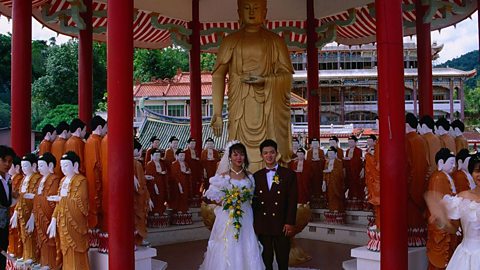
The nature and purpose of marriage
The Buddhist tradition often sees marriage as a legal agreement between partners. It is not a religious duty.
Buddhists generally follow the marriage laws and customs of their country. It is common to visit a temple or have a ceremony there, after the legal ceremony has taken place.
The Sigalovada SuttaPart of the Pali Canon, the oldest surviving set of Buddhist scriptures, this sutta offers guidance for those who are not monks or nuns. offers guidance on how a couple should treat each other. The Five Moral Precepts also offer guidance in this area of life.

The Sigalovada Sutta gives instructions on how men should treat their wives:
In five ways should a wifeвҖҰ be respected by a husband: by honouring, not disrespecting, being faithful, sharing authority, and by giving gifts."
Digha Nikaya 31 (Sigalovada Sutta)
There are also instructions on how a wife should behave in a marriage:
The wife so respected, reciprocatesвҖҰ in five ways: by being well-organized, being kindly disposed to the in-laws and household workers, being faithful, looking after the household goods, and being skilful and diligent in all duties.вҖқ
Digha Nikaya 31 (Sigalovada Sutta)
However, many modern Buddhists would see the duties described as equally applicable to both partners in a marriage.
The Buddha also taught about the importance of friendships and that we are deeply interconnected with those around us. Therefore, many Buddhists would consider that relationships between family and friends help to build a healthy and stable society.
A wedding ceremony in Buddhism
Ceremonies for blessing Buddhist marriages vary from tradition to tradition. Some may be created by the couple themselves.
Below is an example of an Asian Buddhist wedding ceremony:
Polygamy
polygamyPolygamy is the practice of having more than one spouse. is illegal in the UK. According to Buddhist teachings: вҖңBeing a co-wife is painful,вҖқ (TherД«gДҒthДҒ 10:1). Buddhist teachings do not forbid polygamy but suggest, as it could cause suffering, it is not ideal and therefore is not encouraged.
Let him not have a wife in common with another.вҖқ
JДҒtaka 6:546
МэМэ
GCSE exam-style question
Explain two Buddhist beliefs about the importance of marriage.
In your answer, refer to traditional texts or Buddhist teachings.
Answers could include:
A wedding may be very significant to a Buddhist couple, spiritually and socially, enabling them to have their love and care for each other witnessed by others. Buddhism teaches that everything is interwoven and linked, therefore a strong relationship joined by marriage may be viewed as important for the stability of the wider community.
However, generally Buddhists do not see marriage as a religious matter, but as a legal agreement. This is because Buddhism does not include the idea of a God who blesses the marriage. It is also because in the Four Noble TruthsFour вҖҳtruthsвҖҷ that the Buddha discovered during his Enlightenment, about what causes suffering and how we can be free of it. the Buddha taught that suffering comes from craving. He said that the strongest form of craving was sexual attraction, and that family life left less time for meditation and study. Therefore, some Buddhists choose to live as celibate monks or nuns, free of family responsibilities.
Divorce and remarriage
Divorce in Buddhism
Buddhists tend to believe that if couple is unable to live in peace and harmony with each another, it is preferable for the marriage to be dissolved, thus avoiding further dukkhaSuffering. for them and their children.
But most Buddhists would consider that divorce should not be entered into lightly. For example:
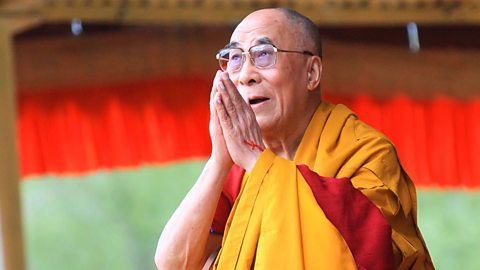
Too many people in the West have given up on marriage. They don't understand that it is about developing a mutual admiration of someone, deep respect and trust, and awareness of another human's needsвҖҰThe new easy-come, easy-go relationships give us more freedom вҖ“ but less contentmentвҖҰ"
The Dalai Lama

Remarriage in Buddhism
Most Buddhists would see remarriage as an opportunity for a new relationship that provides support and happiness.
I believe that at every level of society, the key to a happier and more successful world is the growth of compassion. Just as compassion is the wish that all sentient beings be free of suffering, loving-kindness is the wish that all may enjoy happiness.вҖқ
The Dalai Lama
Through the The Four Sublime StatesThe Buddha believed that the mind of a Buddhist should focus on the beautiful and excellent qualities of loving-kindness (metta), compassion (karuna), sympathetic joy (mudita), and equanimity (upekkha). the Buddha taught that the mind of a Buddhist should focus on the ideal qualities of karunaCompassion.and mettaLoving kindness.. Most Buddhists would consider it important to have karuna for those whose relationships have broken down, and to be glad for those who find happiness in a new close relationship.
In pictures: Families, relationships and marriage in Buddhism

Image caption, Although a Buddhist wedding is not a religious event, it is common in some Buddhist traditions for a monk, nun or other leader to bless the marriage after a legal ceremony has taken place.
Image caption, In some Buddhist traditions, during the wedding ceremony, a white thread may be used to tie the couple together, symbolising their coming together in marriage.
Image caption, Ceremonies for blessing Buddhist marriages vary from tradition to tradition and may even be designed by the couple. This is a same-sex Buddhist wedding blessing in the UK.
Image caption, The Buddha gave many teachings on the importance of wisdom and compassion which are important to Buddhists in all aspects of life, including family life.
Image caption, The Dharma Wheel (dharmachakra) represents the BuddhaвҖҷs Noble Eightfold Path which guides Buddhists in all aspects of life including family life.
1 of 5

МэМэ
МэМэ
МэМэ
Remember
There are two main divisions of Buddhism.
Find out more about Theravada Buddhism and Mahayana Buddhism.
What does Buddhism teach about same-sex marriage?
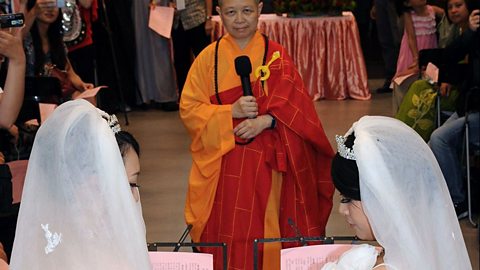
Many Buddhists would make little distinction between homosexualityBeing attracted to people of one's own sex or gender. and heterosexualHeterosexual is the word to describe people who are sexually attracted to people of the opposite gender.relationships, although this will vary, depending on the cultural views of where they live.
For many Buddhists, it is the ethical quality of the relationship, rather than the gender of the partners, that determines whether or not a relationship is ethical or not.
Homosexuality is neither right nor wrong. It is just something that people do.вҖқ
Ven. Master Hsing Yun (Chinese Buddhist teacher)

GCSE exam-style question
Explain two Buddhist attitudes to same-sex relationships.
In your answer, refer to traditional texts or Buddhist teachings.
Answers could include:
The Buddha did not say anything about same-sex relationships, but in the Third Moral PreceptOne of the Five Moral Precepts in Buddhism: To refrain from sexual misconduct or misuse of the senses. he did teach about avoiding вҖҳwrongвҖҷ, or unethical, sexual behaviour. Many Buddhists place a high value on family and because men and women can procreate, some view these relationships as acceptable and ideal. Therefore, they may not accept same-sex relationships because these couples cannot naturally conceive children.
In 1997, the Dalai Lama said that according to traditional Buddhist texts: "Sexual organs were created for reproduction between the male element and the female element вҖ” and everything that deviates from that is not acceptable from a Buddhist point of view,". However, he has often said that this traditional view could change.
Other Buddhists consider that homosexualityBeing attracted to people of one's own sex or gender. and heterosexualHeterosexual is the word to describe people who are sexually attracted to people of the opposite gender. are both ethically neutral. They argue that what makes any sexual relationship ethical or unethical is how the partners behave towards each other.
вҖң[Homosexuality] is neither right nor wrong. It is just something that people do. If people are not harming each other, their private lives are their own business,вҖқ (Hsing Yun, Buddhism Pure and Simple, pp. 137вҖ“138).
Sex before marriage and cohabitation
Many Buddhists believe sex outside of marriage is acceptable and do not consider marriage necessary. It would be important to them to avoid unskilful sexual behaviour, for example, behaviour which causes suffering because it is selfish, greedy or dishonest. Such behaviour would be a breach of the Five Moral Precepts.
However, other Buddhists may consider unmarried sexual relationships as unskilful and a breach of the Third Moral PreceptOne of the Five Moral Precepts in Buddhism: To refrain from sexual misconduct or misuse of the senses. .
Many Buddhist monks and nuns choose a life of celibacy. This is so they can live free from the attachment of sexual desire and intimate relationships and have more time and energy for meditation, study and reflection.
However, there is a great deal of variation across the Buddhist world, for example, in the Zen tradition, which is part of Mahayana Buddhism, priests are often married.
Adultery
Most Buddhists would consider adulterySexual intercourse between a married person and a person who is not their spouse. to be a breach of the Third Moral Precept because of the dishonesty and craving which is usually involved, and the suffering it causes to all those involved. This would also apply to unfaithfulness in relationships where couples are not married.
Not to be contented with one's own wife, and to be seen with harlots and the wives of others вҖ“ this is a cause of one's downfall."
Parabhava Sutta
Contraception
Most Buddhists today would consider the use of contraception as a responsible method of limiting family size and preventing unwanted pregnancies.
Some Buddhists believe that rebirth takes place at conception, therefore disagree with some contraceptive methods, as they see these as breaking the First Moral PreceptOne of the Five Moral Precepts in Buddhism: Refrain from taking life..
МэМэ
Video
Watch the video below to compare Buddhist, Christian and Jewish attitudes and teachings towards procreation.
Buddhist
Hello. I'm a Buddhist.
Christian
I'm a Christian.
Jewish
And I'm Jewish.
Buddhist
And our religions all agree that sex is an important part of a loving relationship.
Christian
So in the UK, the age of consent is 16. And when religions talk about a loving relationship, they usually mean marriage.
Jewish
One of the main reasons for that is to provide safe and secure conditions for procreationвҖҰ
Buddhist
вҖҰwhich means having a babyвҖҰ
Christian
вҖҰor babies.
Jewish
Some religious people say that whenever a couple has sex they should always be open to the possibility of procreation, because they believe that's what sex is for.
Buddhist
And this affects what they think about contraceptionвҖҰ
Christian
вҖҰthe methods that people use to prevent having children.
Jewish
So are there any circumstances where religious people accept the use of contraception?
Buddhist
Unlike most other religions, getting married and having children is not expected in Buddhism. In fact, some Buddhists believe that celibacy, not having sex and not getting married, is something to aim for. But if you choose to have sex, Buddhism teaches that it should be part of a committed relationship.
Christian
Christianity teaches that sex should only happen between people who are married. The Catechism of the Roman Catholic Church, which lists all its beliefs and rules, says that every time a couple has sex, they should be open to the possibility of pregnancy.
Jewish
And many Jews would agree with that. The Torah says that God told his people to 'Be fruitful and multiply'. So many of us take that as a mitzvah, a commandment to get married and have children.
Buddhist
But many Buddhists would disagree. Sex doesn't always have to be about having children. We believe it can help a couple to develop 'metta', loving kindness and 'karuna', compassion. So some forms of contraception are accepted. We try to live by the principle of 'ahimsa', which means non-violence or non-harming. And Buddhism teaches that life begins at conception. So barrier methods of contraception are accepted, non-barrier methods are generally not.
Christian
Many Christians would agree that life begins at conception. In the Bible, the writer of Psalm 139 talks about God seeing my 'unformed body' in the womb. So the Roman Catholic Church teaches that if a married couple wants to avoid pregnancy temporarily, then they should use natural family planning methods rather than contraception. The only exception to the no contraception rule is if a pregnancy would put a woman's health in danger. Protestant churches, like the Church of England, the Methodist Church and the Baptist Church, generally do accept that most couples will use contraception, but they also encourage them to have families when they feel ready.
Jewish
Orthodox Judaism generally instructs couples not to use contraception, so that pregnancy remains a possibility. However, an ancient collection of Jewish writings, called the Talmud, does allow it if there are good medical reasons for not getting pregnant. Many Conservative and Reform Jews accept the use of contraception, but itвҖҷs still seen as the couple's duty to have children.
Buddhist
As a Buddhist, I believe human life is precious. I think all people do. So I'd need to think carefully about bringing a baby into the world. Contraception is definitely something I would want to consider so I can plan when to have a family.
Christian
So all our religions agree that sex should be part of a loving and committed relationship.
Jewish
But we don't agree that sex always has to be open to the possibility of procreation.
Buddhist
Some religions accept the use of contraception either to prevent having childrenвҖҰ
Christian
вҖҰor to space out their birthsвҖҰ
Jewish
but the kind of contraception used and the reasons for using it can depend on when a religion believes that life begins. But what do you think?
GCSE exam-style question
Explain two Buddhist views about contraception.
Refer to sacred writings or another source of religious belief and teaching in your answer.
Answers could include:
There are no teachings for or against contraception in Buddhism. Most Buddhists would consider that the use of contraception to limit the size of oneвҖҷs family shows responsibility and kindness. The Dalai Lama has stated: "Only recently has the size of our population grown to the point that it has a direct impact on nature," (The Natural World XIV).
However, there are different Buddhist beliefs based on the five moral precepts as well as ethical reasons about the type of contraception being used and how they work. The First Moral Precept says: "Refrain from taking life", which may dictate which methods of contraception are considered acceptable.
The roles of men and women
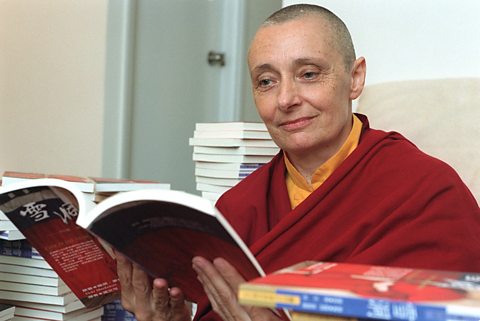
the BuddhaAround 2,500 years ago, a man called Siddhartha Gautama was born. At his Enlightenment he became known as the Buddha, which means вҖҳthe one who knowsвҖҷ. The path of training he taught is known as Buddhism. taught that men and women were equally capable of developing the compassion and wisdom of enlightenmentWhen a Buddhist finds a state of perfect of wisdom and compassion, said to bring an end to suffering and the cycle of rebirth. and the early scriptures record him teaching both genders, whether monastic or layNot belonging to or ordained into religious leadership..
However, there are many examples of inequality within Buddhism. For example, in some Buddhist traditions women are ordained to a lower level than monks.
Some Buddhist teachers, such as Ajahn Brahm, a Theravadin monk in Australia, have broken with tradition by ordaining women to the same level as men.
Other leaders have created new traditions without monks or nuns, such as Sangharakshita, founder of the Triratna Buddhist Order. Members of this Order all have the same ordination, regardless of gender, and whether they are in sexual relationships or choose to be celibate.

GCSE exam-style question
Explain two Buddhist beliefs about gender equality.
Refer to sacred writings or another source of religious belief and teaching in your answer.
Answers could include:
The earliest scriptures, such as the Culavagga (Vinaya Pitaka), quote the Buddha as saying that women could become enlightened. However, Buddhist women have not, traditionally, been treated as equal with men, especially if they were nuns.
In more recent times, the situation has been changing. There are now many women Buddhist teachers around the world, and there are changes being made to traditional rules. In her book, Blossoms of the Dharma: Living as a Buddhist Nun, Khandro Rinpoche, a female Tibetan Buddhist teacher says: "modern women in the Sangha are re-energising ancient traditions".
Test your knowledge on Buddhism
Relationships and families Buddhism quotes
1 of 5
